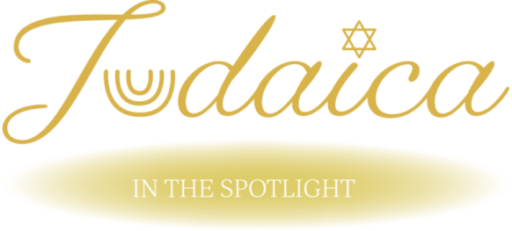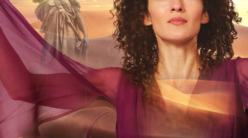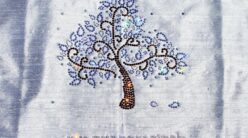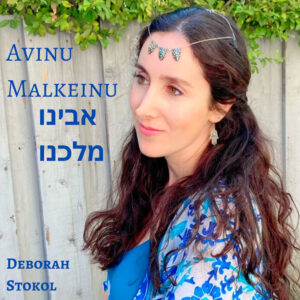
Photo: Courtesy of Deborah Stokol
Tell us a little bit about yourself and your background.
I am an Argentinean – South African – American-Jewish multi-instrumentalist, singer, composer, and producer. I have sung all my life, studied and played the piano for 31 years, and have written music for nearly as long — doing so to worlds of my imagination, my own words, passages from literary and sacred text, accompaniment to school plays, and works of the bardic tradition.
I studied Music and English in college and Journalism in graduate school, working as a journalist for several years before becoming a full time English and Writing teacher, at which I worked for 12 years. Through that, I never stopped making music.
Though I formally studied theory, piano, singing, and composition, I taught myself harp, guitar, mandolin, and music production.I studied classical and jazz music for years and was a member of choirs for 15. I think we constantly take things in from our world. At all moments, we are internalizing information, and it comes out in our expressions. So I feel like my music is some hybrid of literary, fantastical, Jewish, Russian, tango, jazz, classical, folk, choral, Bachian, Medieval, mystical, Vaudevillian…
Storytelling — across media and others’ and my own — has played a significant role in my life, and I love immersing myself in literature. It’s one of the reasons I write prose and poetry and teach books and writing. For the past 25 years, I have composed melodies to passages from books in addition to ones from my imagination to words of my own — and when I got a harp, that really allowed me to create music to works of the bardic tradition.
A bard is a musical storyteller who connects teaching, reporting, sharing history, poetry, singing, and playing and declares tales of great or otherwise forgotten deeds. Homer was a bard. When we say “The Song of…” (e.g., The Song of Songs / Song of Solomon, The Song of Roland, The Song of Deborah, The Song of Achilles, The Song of Hiawatha, The Song of Ice and Fire…), we mean the story of someone’s life. People want to be seen and remembered and continue their legacy, or they wouldn’t create, have children, attempt to share their acts, blog, post on social media…this is where the term “unsung hero” comes from. It’s all such an intrinsic part of being human – knowing that we will die and wanting to leave something behind to prove that we were once here. I gave a talk and performance on this at SXSW Edu 2019 called “Teaching the Bardic Tradition as a Bard.” And most of the bardic tradition is the oral tradition – singing and speaking without writing and passing down stories that way.
I often add melody to works of this tradition like The Odyssey, Song of Songs, Beowulf, The Iliad, among others, and have shared them with my students when we study those texts in order for them to experience the stories in their original media, for them to feel connected to them, and see they can take ownership of literature in their own way.
Judaism is incredibly important to me. And one of the ways that plays out lies with music. I love listening to and making music that is Jewish in idea, theme, or words. I just released my interpretation of the “Avinu Malkeinu” as a jazz vocal piece; I have an instrumental version of it and have a song coming out with my melody to the Lecha Dodi, to Psalm 45, to the story of Deborah (what can I say? She’s a cool namesake!), and some covers of Jewish folk tunes in addition to original music to literary works, myths, legends, and ones from my own head. I just put out one about The Canterbury Tales’ The Wife of Bath, Achilles, Odysseus, and Medieval-Renaissance imagery. I hope you can check it out!
What inspired you to become a musician?
It is a positive and passionate compulsion. While I have taken breaks from listening to and making music, I have always in general had it loom large in my life and returned to it in a serious capacity after each brief time away. So even though I went to school through the levels, then worked as a reporter and then as a teacher these 15 years all told, I never stopped making music. Music is a language, and language has musicality. They relate to one another, and I love both. During the pandemic, I realized I needed to step away from full-time teaching for now to focus on music, and it has felt really fulfilling to be working as one with focus and attention.
What do you enjoy most about your chosen profession?
As much as I love language as a communicative form and a means by which to express ideas and share emotion and art, and as much as I love words and etymology themselves, there are things that words cannot reach, things that with words are approximations because they transcend the human ability to describe.
Where words fail, music can succeed. It gives a body to things we feel but cannot quite name. It is a medium that expresses the otherwise potentially ineffable.
I like that though your average song is about three to four minutes, in it exists an entire world, that you can experience a host of things and hear things that are objectively brief but can feel eternal. Maybe that’s what I love about music, itself. As for the profession, I love that it allows you to maintain discipline while still being creative and extricating something from within. It can be solitary or collaborative. It allows you to share significant parts of yourself while connecting with others.
Do you believe classical training is essential to be successful?
I do not, and we have again and again seen evidence that it is not necessary to be successful — and also that how you define successful is personal and subjective.
That said, I love classical music, and I am trained classically and love listening to a great deal of music within that enormous genre and going to concerts, and I think classical music — again, such a big category — offers chords, harmony, counterpoint, history, and nuance that no other musical form does so fully or richly.
Within that very large genre and long history, there is such a wealth of beauty, experience, and things from which to learn and enjoy, that it would be a shame — from pretty much every standpoint — to not know something about that.
But one does not “need” it to “make it.” I just think it truly enriches the soul and artist (and trains one in discipline and deep levels of theory which play out in the compositions and performance technique)!
What is your favourite piece of music and why?
Oh my goodness, that is so difficult to answer! It really depends on my mood and the time in my life. So much music has spoken to my soul that I think I cannot choose a favorite, and sometimes you love a piece so much you don’t want to sully it by “over-listening” but must listen to a song on a repeat that is not “perfect” because it’s a way to reach resolution and make peace with it… But some of the composers and musicians I return to again and again are J.S. Bach — e.g., his partitas — works by Hildegard von Bingen, Franz Schubert, Robert and Clara Schumann, Felix Mendelssohn, Bill Evans, The Beatles, Ofra Haza, Jon Brion’s production, Danny Elfman, Michel Legrand, Steely Dan, Thomas Newman, Jethro Tull, Kanye West, Radiohead, Stevie Wonder, Sting, Procol Harum…
It seems these are all very different, but they have in common an ability to steep a listener in an entire world. When I love a song, I want to live there. I want to know that I am stepping inside a lush universe I will inhabit for a time, and when it comes to creating rich harmony and fluid lines, no one rises above Bach.
Bingen, like Bach, helps one transcend. Chopin, Schubert, the Schumanns, Mendelssohn envelop you in a tender, poignant colorful pathos, as do Bill Evans, Michel Legrand, and Jon Brion. The Beatles offer fantastical yet nostalgic work over and over, and Jethro Tull takes me to a place of fantastical Medievalism. Stevie Wonder, Steely Dan, Danny Elfman, Thomas Newman, Sting, Kanye West, Radiohead, and Procol Harum create profound soundscapes that are harmonically and rhythmically challenging. While listening, you ask yourself, what is going on here? And you want to cross some invisible threshold to find out.
They are all masters of sublime feeling, harmony, poetry, rhythm– taking you on a mystical adventure that reveals something true and meaningful about life and humanity.
What was your first performance like?
Hmm…I am not sure I can remember a first performance because I have played and sung since I was a child, but I was always making up small silly songs as a little girl, whether in company and alone, and a formal performance would have likely been a piano recital in first grade or so, with other small children and kindly, supportive adults, rice krispie treats, lemonade, a floral dress and a curtsy.
How much do you practice in an average week?
I mentioned that I have made music most of my life, but I also described how I have had to focus on other things “first” — be they school, journalism, teaching, etc. — so when that happens, I have been lucky to play about an hour a day or every few days. There have been times I couldn’t play for weeks. Though, in general, I would often spend weekend days making music for several hours. I think the 10,000 hours have probably happened, though. And there have been a few, rare times in my life, in university, and finally now, say, when I could dedicate four-six hours — though probably not just of playing; that might the composition, planning, production — and that has felt very exciting. When you can finally dedicate the time to something you love or feel compelled to do, it gives you access to things within that you never knew were there and really have the chance of discovering.
Which musician would you like to collaborate with next?
There are so many — some well-known and others less so, but of those who are alive, I dreamabout working with Jon Brion, Ramin Djawadi, Thomas Newman, Paul McCartney, Trent Reznor, Stevie Wonder, Radiohead, Tori Amos, Fiona Apple, Avishai Cohen, Sting, Rachel Portman, Alexandre Desplat, John Williams, Danny Elfman, Hans Zimmer, Brad Mehldau, Kanye West, Chris Thiele, Anne Dudley…and so many others…
What advice would you give to an aspiring musician?
- Know what you want to get out of this. In other words, what is “the goal”? That informs the method, schedule, and expectations.
- Keep practicing.
- Listen to other music, but do not think you have to sound like it. You should sound like what you need to sound like to feel like it is your authentic expression.
- Just because you may not like what you initially make does not mean you won’t like it eventually. To be a musician is to love music, so keep going until you are proud of what you make. The skill will catch up to the passion and talent, and know that being a perfectionist means also accepting you may never be fully satisfied with the result, but that does not mean it is not “good” or that you should not feel proud!
- If you need to take breaks from listening to or making music, do not worry. It means you are in a place of rest, and in order to improve and keep going and enriching yourself, that sometimes actually means walking away, resting, releasing, not doing.
- Remember the joy!
How can our readers book you?
Some of my music is on Spotify, Apple / iTunes, Amazon, Pandora, YouTube under Deborah Stokol. I have a web site at deborahstokol.com, a Patreon under Deborah Stokol – Kairos Records (I welcome and truly appreciate any and all support of all kinds!), an Instagram @kairosrecordsmusic, email kairosrecordsmusic@gmail.com for music, kairosrecordspublishing@gmail.com for writing, and ms.stokol@gmail.com for teaching, and Deborah Stokol – Kairos Records for my public Facebook. I hope folks get in touch!
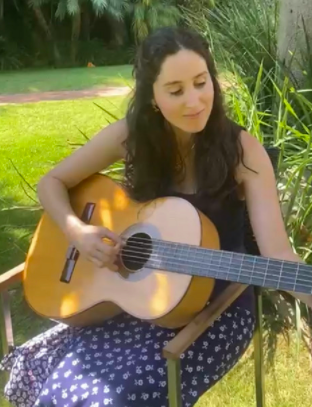
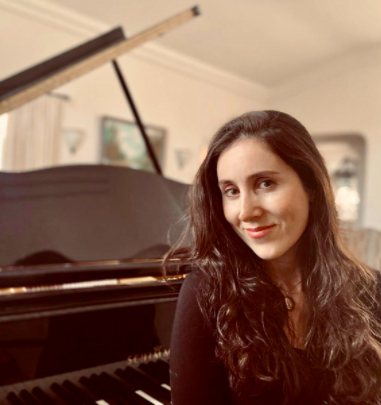
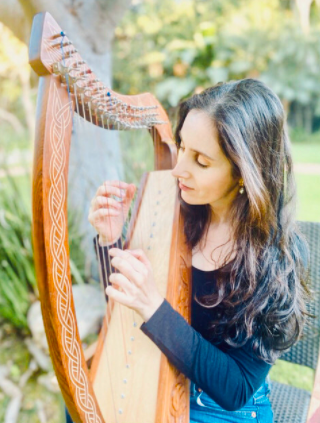
Photos: Courtesy of Deborah Stokol
